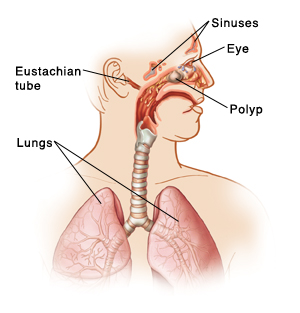Nasal Allergies: Related Problems
Nasal Allergies: Related Problems
Allergies can cause nasal passages to swell. This narrows the air passages. Allergies also cause increased mucus production in the nose. These changes result in nasal allergy symptoms. Common symptoms include itching, sneezing, stuffy nose, and runny nose. Nasal allergies can also cause problems in other parts of the respiratory system. Some of the more common problems are discussed below. If you think you have any of these problems, talk to your healthcare provider about treatment choices.
Sinus infections
Fluid may be trapped in the sinuses. Bacteria may grow in trapped fluid. This causes sinus infection (sinusitis).
Conjunctivitis
Allergens irritate your eyes, including the lining of the conjunctiva. This causes eyes to become red, itchy, puffy, and watery.
Ear problems
The eustachian tube connects the middle ear to nasal passages. Allergies can block this tube, and make the ears feel plugged. Fluid may also build up, leading to an ear infection (otitis media).
Nasal polyps
Allergies cause nasal passages to swell. Constant swelling can lead to formation of a sac called a polyp. Polyps can grow large enough to block nasal passages.
Asthma
Asthma is inflammation and swelling of the air passages in the lungs. The symptoms are wheezing, shortness of breath, coughing, and chest tightness. Allergies, including nasal allergies, are common in people with asthma.
Updated:
October 09, 2017
Reviewed By:
Berry, Judith, PhD, APRN,Blaivas, Allen J., DO,Image reviewed by StayWell medical illustration team.
